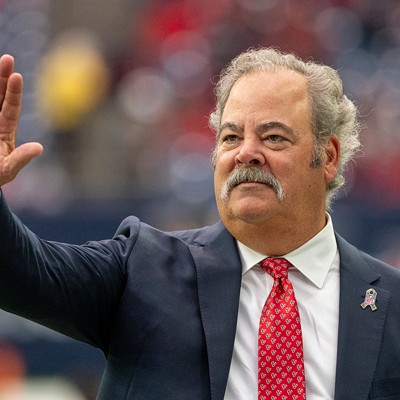It seemed like the exact inverse of seeing Larry the Cable Guy performing in Berkeley, and Hair Balls very easily intrigued a very close friend into making the road trip after work last night.
Vowell had been brought there by Lamar University as part of their speaking series, and the show was free and jam-packed. After some lame intros from two Lamar deans, neither of whom showed themselves to be Vowell scholars or fans of any note whatsoever, the squeaky-voiced ironist took the stage with a lament about her hotel.
"It has a big honkin' Ten Commandments out in front of it," she noted. "They don't really do that where I live now." (A native of Muskogee, Oklahoma, Vowell now resides in New York.)
She added that the hotel's budget might have been better served ensuring that the copy machines in the business center were functional rather than seeing to it that all guests and visitors were scripturally admonished.
Vowell moved from there to a reading from a New York Times piece she wrote on the occasion of some yahoos in Austin wanting to put the Ten Commandments on the grounds of the Capitol. She noted that there were already monuments to both the Confederacy and the Alamo there, and that last gave her plenty of ammo.
"It was a monument to the Texans, who stole Tejas from the Mexicans, who stole it from the Spanish, who stole it from the Indians. Wasn't there something about stealing in the Ten Commandments?"
She went on to describe what it was she loved so much about writing about history. "There is no 'good old days.' People have always been as greedy, corrupt and beholden to their genitalia as they are today, and I find that comforting."
She read at length from the introduction of her upcoming apparently still-untitled book, a historical study of early American exploitation of Hawaii. She described modern-day Honolulu's skyline as possessing a "very Brady Brutalism."
Next came readings from The Wordy Shipmates, her history of Puritan Massachusetts, and how she believed the seeds for our revolution sprouted there from their adherence to the Magna Carta and the Geneva Bible.
Along the way she stated she "had no sympathy for the voters of Texas." The crowd -- seemingly the entire arts faculty at Lamar along with a couple of hundred students and scattered bedraggled pillars of the Golden Triangle intelligentsia -- chuckled, which turned into a roar when Vowell added, "No offense. You freaks."
Perhaps the biggest laugh of the night came when she read from You're A Horrible Person But I Like You: The Believer Book of Advice, in which she goes all Anne Landers alongside people like Zach Galifinakis, Sarah Silverman and a bunch of people from The Daily Show.
Vowell read her response to a letter from a man who described himself as a "member of the intellectual elite" who "spoke five languages," and "frequented fine plays and the opera," but who fretted that he did not like professional sports and couldn't change the oil in his car.
Dear So-and-So, Vowell responded. "Is one of the five languages Pussy?"
That line reminded me that Vowell's Redneck America roots were likely not far from many of those in attendance here at this third- or fourth-tier state school. As sophisticated as she is now today, she is after all an Okie from Muskogee -- about a quarter Cherokee and a descendant of cowboys and Confederates -- who each summer attended Vacation Bible School and hunted with her dad. It's a quantum leap from there to NPR darling...
During question time, one cranky, bearded professor type asked Vowell what she thought of all the people who texted while she talked. She said they were cyborgs and couldn't help it.
Another guy asked her what...oh my God, this guy really asked Sarah Vowell what she thought about states rights. After chuckling ruefully, she said they seemed like a good idea on paper, but too often were used as code for "we don't like black people and we want to stop them from voting." She also used the question as a platform to attack our state school board for the recent textbook debacle; the guy's defense of "What about Kansas?" was drowned out in the roar of approval that greeted Vowell's original bashing of us.
But she dwelt most at length on perseverance. In spite of having what she described implicitly as a pretty perfect working life, there was quite a lot that she didn't like about her job. Specifically, she's a stay-at-home type whose non-fiction writing requires her to get out in the field reporting, sometimes at great peril to her sanity.
She told the story of a 19th Century German cartographer named Preuss who accompanied the dashing John C. Fremont on some of his Lewis and Clark-style adventures in the American West. She saw this Preuss as a soul-mate and quiet hero. While Fremont wrote in his diary of forcefully planting the Stars and Stripes on top of high peaks, his square jaw set and his eyes set on the middle distance, Preuss whined of tumbling down a mountain side, tearing his pants and bruising his "arse." That is when he was wasn't whining about the awful food and longing pathetically for a bottle of wine and swooning for the civilized comforts of his native land.
Through it all, though, Vowell noted, he kept a stiff upper lip, so much so that in his own diary, Fremont singled out Preuss as one of the more cheerful members of the expedition, in direct contrast to what the man himself apparently was actually feeling. "You can be a hero even if you're a footnote," she said. "Even if you're just a guy who wanted to draw some maps."
Another time she hated her job was during her trip to the Dry Tortugas. During the course of writing Assasination Vacation, her study of the murders of presidents Lincoln, Garfield and McKinley, she traveled to the ruins of Fort Jefferson, a former island prison south of Key West. While others on board the small boat sailed there to snorkel, he was going in order to interview a park ranger and commune with the restless spirit of Dr. Samuel Mudd, the accused and later pardoned conspirator in the Lincoln's assassination. The wave-tossed voyage taught to loathe both the sea and Jimmy Buffett, whom she now associates indelibly with non-stop vomiting. (Not that it takes seasickness for all of us to arrive at that assessment...)
Finally on dry land, Vowell and some of the snorkelers toured the former prison, and the park ranger showed them Mudd's old piano. Dr Mudd may or may not be the man who gives us the phrase "his name is mud." He was accused of setting John Wilkes Booth's broken leg while the assassin was on the run; actually, there is no question he set Booth's leg -- the question is, did he know he was aiding the man who blew out Honest Abe's brains?
Vowell here noted that there was one in every crowd, and in the one there at Fort Jefferson, it was a fortysomething guy there with his two teenage daughters asked the ranger if he could play Mudd's piano. Vowell was mortified, more so when the ranger said yes, and even more so when the man sat down and started to play what Vowell described as "a terrible version of 'Lean on Me.'" (As embarrassed as Vowell was, she noted that the emotion was still more keenly felt by the man's daughters.)
Which set that ironic mind of hers to thinking..."What better song could he have played on Samuel Mudd's piano? Isn't 'Lean on Me' exactly what Mudd would have had to say to John Wilkes Booth while he set his broken leg?"
We wondered if Vowell had felt like her name was Mudd on this tour stop. On the way back to my friend's car, the two of us imagined her firing her agent, her squeaky voice rising as she lamented the Ten Commandments in front of her hotel, the cyborgs in the audience, the weak intro from the clueless Lamar faculty, and the fact that there this is perhaps the only university in America with petrochemical plants practically on the Quad. She was a long way from Greenwich Village, but maybe not so far from the Muskogee she fled decades ago.
But we doubted any such convo took place. Like Preuss, we're betting Vowell saved that diatribe for her diary.
So all in all, this turned out to be this writer's happiest Beaumont experience ever, as we have something of a fraught personal history of the place we know and love as The Armpit of Texas. (Read on if you care about this writer's family history. If not, you're done.)
For one thing, it is the place where my mother's side of the family buries its dead, as it is the hometown of my grandmother Susy Taylor. One of her ancestors -- her seafaring family's roots in the area extend back to the days of the Texas Republic -- bought a huge cemetery plot there in the same graveyard that houses the Big Bopper, and the last two trips I have made there were to commit the remains of my mother and grandfather to eternity.
Susy escaped Beaumont's swampy, benzene-scented embrace in the 1940s, very seldom to return, except for those funerals, and every Thanksgiving up until about 1985, when her Aunt Julia passed away.
Aunt Julia was my grandmother's spinster aunt who served for several decades as the head librarian at Lamar University. She was also something like the prefect of discipline for my mom and her five sisters -- if my grandmother was at her wits end with one of the girls, she would be packed off to Beaumont, where Aunt Julia would be given free rein to sand off some of these incipient rough edges with techniques she had honed from her own Victorian upbringing and/or later, when she was riding herd on rambunctious Southeast Texans who for generations tried (and failed miserably) to turn her library into a playhouse.
My experience of her revolved around Thanksgivings. My grandfather would come roust us all way too early, and my four aunts (none of whom was more than ten years older than me) would be stuffed in the back of one of his succession of boat-like American four-doors for the long drive to Beaumont.
I say long drive because Moe, my grandfather, liked to cruise at roughly 47 miles an hour in the fast lane on I-10, obliviously spawning discord all around, placidly helming his Delta 88 full of squabbling kids to a quaint house full of ceramic kitty-cats and Depression Era Deep South holiday cuisine. (Think marshmallows where you least expect them...)
In truth, Aunt Julia was a grande dame. She fostered a love of reading in my family that luckily passed down to me, and might be why all six of you are reading this right now. And she made enough of a mark on the good people of Lamar that they named one of the school library's reading rooms after her, which we decided to visit before heading in to the Sarah Vowell show.
And there it was -- a huge couch-dotted, ladylike tea-sipping room on the eighth floor, complete with a panoramic view of Beaumont's carcinogen-spewing petrochemical complex. A portrait of Aunt Julia in all her plump and matronly, blue-rinsed, granny-glasses glory presided serenely over it all, and took me back to many an early-morning Waldorf salad and Christmas present of Robert Louis Stevenson's Kidnapped, with illustrations by Wyeth.
Photos done, my friend and I headed back to the elevator. The doors opened and two Lamar cops were inside. "Who y'all?" one of them asked, with commendable economy of verbiage.
I told them that I was here to see my great-great-aunt's reading room. The terse cop told us we had tripped a silent alarm. To back my story, I proudly showed him the pictures we had taken of me posing with Aunt Julia. "Alright, alright, I believe you," one of them laughed, as they walked off to reset the alarm.
So Aunt Julia had been given the power to shush for all eternity. Pretty cool.
We hoped to show Vowell our picture of us with Aunt Julia after the show, but she seemed pretty eager to get back to her hotel, big honkin' Ten Commandments or not.






